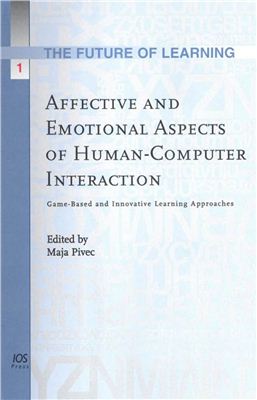Издательство IOS Press, 2006, -333 pp.
The aim of the interdisciplinary workshop Affective and Emotional Aspects of Human- Computer Interaction: Emphasis on Game-Based and Innovative Leaing Approaches is to define new research directions related to affective and emotional approaches to computer-supported leaing and human-computer interactions. The workshop is a unique opportunity to bring together, on the one hand, scientists and research contributions from psychology, educational sciences, cognitive sciences, various aspects of communication and human computer interaction, interface design and computer science and, on the other hand, educators and the game industry. The intensive exchange of information from various research fields should open the gates for evolutionary change and new research directions in technology-supported leaing.
Part of the research presented at the ESF workshop is published in this book. For the purpose of this book publication, an additional call for chapters was issued to the inteational research community, so as to obtain contributions worldwide that reflect the current research in this field. Gathered and reviewed, eighteen selected contributions are grouped into three topics: Game-based Leaing, Motivation and Leaing, and Emotions and Emotional Agents.
To decide how to categorize the contributions was a very difficult task, hence all the contributions explore the leaing process as an emotional and personal experience that is addictive and motivates the leaer to proactive behavior. The major topics such as emotions, motivation, games and game-experience, though in different equivalents and various priorities, are present in all of the contributions, thus offering a variety of possible solutions for contribution classification. However, I leave the challenge to organize the contributions differently for the next publication.
Game-Based Leaing
Affective Gaming: Advancing the Argument for Game-Based Leaing
Didactic Analysis of Digital Games and Game-Based Leaing
Immersive Environments: What Can We Lea from Commercial Computer Games?
What Is a Game Ego? (or How the Embodied Mind Plays a Role in Computer Game Environments)
Multiple Motivations Framework
An Instructional Design/Development Model for the Creation of Game-Like Leaing Environments: The FIDGE Model
Leaing when Using Commercial Computer Games as Simulations: A Case Study Using a Simulation Game
Serious Games and ‘Simulation Based E-Leaing’ for Infrastructure Management
Motivation and Leaing
Leaing and Motivation with Virtual Tutors. Does It Matter if the Tutor Is Visible on the Net?
Achievement Motivation, Performance Structure, and Adaptive Hypertext Leaing
An Interactive Dictionary of Concepts: An Exploratory Platform for Enhancing Communication Between the Concepts Which Form and Inform Us
Human-Computer Interaction: Sharing of Intergenerational Wisdom and Cross-Cultural Knowledge
Designing the Stimulation Aspect of Hedonic Quality – An Exploratory Study
Emotions and Emotional Agents
On the Role of Self Esteem, Empathy and Narrative in the Development of Intelligent Leaing Environments
Empathic Characters in Computer-Based Personal and Social Education
Using Machine-Leaing Techniques to Recognize Emotions for On-Line Leaing Systems
A Framework for Emotional Agents as Tutoring Entities
A Haptic Computing Logic – Agent Planning, Models, and Virtual Trees
ESF SCSS Exploratory Workshop on Affective and Emotional Aspects of Human-Computer Interaction: Emphasis on Game-Based and Innovative Leaing Approaches
The aim of the interdisciplinary workshop Affective and Emotional Aspects of Human- Computer Interaction: Emphasis on Game-Based and Innovative Leaing Approaches is to define new research directions related to affective and emotional approaches to computer-supported leaing and human-computer interactions. The workshop is a unique opportunity to bring together, on the one hand, scientists and research contributions from psychology, educational sciences, cognitive sciences, various aspects of communication and human computer interaction, interface design and computer science and, on the other hand, educators and the game industry. The intensive exchange of information from various research fields should open the gates for evolutionary change and new research directions in technology-supported leaing.
Part of the research presented at the ESF workshop is published in this book. For the purpose of this book publication, an additional call for chapters was issued to the inteational research community, so as to obtain contributions worldwide that reflect the current research in this field. Gathered and reviewed, eighteen selected contributions are grouped into three topics: Game-based Leaing, Motivation and Leaing, and Emotions and Emotional Agents.
To decide how to categorize the contributions was a very difficult task, hence all the contributions explore the leaing process as an emotional and personal experience that is addictive and motivates the leaer to proactive behavior. The major topics such as emotions, motivation, games and game-experience, though in different equivalents and various priorities, are present in all of the contributions, thus offering a variety of possible solutions for contribution classification. However, I leave the challenge to organize the contributions differently for the next publication.
Game-Based Leaing
Affective Gaming: Advancing the Argument for Game-Based Leaing
Didactic Analysis of Digital Games and Game-Based Leaing
Immersive Environments: What Can We Lea from Commercial Computer Games?
What Is a Game Ego? (or How the Embodied Mind Plays a Role in Computer Game Environments)
Multiple Motivations Framework
An Instructional Design/Development Model for the Creation of Game-Like Leaing Environments: The FIDGE Model
Leaing when Using Commercial Computer Games as Simulations: A Case Study Using a Simulation Game
Serious Games and ‘Simulation Based E-Leaing’ for Infrastructure Management
Motivation and Leaing
Leaing and Motivation with Virtual Tutors. Does It Matter if the Tutor Is Visible on the Net?
Achievement Motivation, Performance Structure, and Adaptive Hypertext Leaing
An Interactive Dictionary of Concepts: An Exploratory Platform for Enhancing Communication Between the Concepts Which Form and Inform Us
Human-Computer Interaction: Sharing of Intergenerational Wisdom and Cross-Cultural Knowledge
Designing the Stimulation Aspect of Hedonic Quality – An Exploratory Study
Emotions and Emotional Agents
On the Role of Self Esteem, Empathy and Narrative in the Development of Intelligent Leaing Environments
Empathic Characters in Computer-Based Personal and Social Education
Using Machine-Leaing Techniques to Recognize Emotions for On-Line Leaing Systems
A Framework for Emotional Agents as Tutoring Entities
A Haptic Computing Logic – Agent Planning, Models, and Virtual Trees
ESF SCSS Exploratory Workshop on Affective and Emotional Aspects of Human-Computer Interaction: Emphasis on Game-Based and Innovative Leaing Approaches

